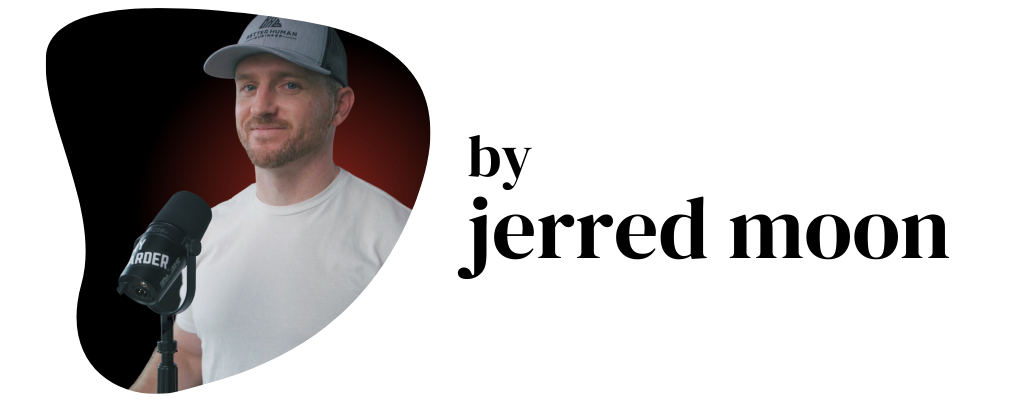Story is the most powerful tool to compel the human brain. If you want to become better at marketing, build a brand that resonates, or simply not bore people at dinner parties—then you need to get better at storytelling.
For years, I didn’t think I had any great stories to share. I assumed my path was too boring, or too straightforward. But what I was really lacking wasn’t story—it was structure.
Once I learned a simple 10-step framework for storytelling, everything changed. I could craft powerful messages for my content, create clarity in my brand, and even deepen my connection with customers.
So in this post, I’ll share the exact storytelling framework I use, walk through my personal story using it, and then help you apply it to your own life, your marketing, and your brand.
My 60-Second Story (Using the Framework)
Let’s start with the short version of my story. It’s 100% true, but I’ve trimmed it to fit the framework so you can see how it works in real-time:
I used to believe the path was simple: get a good job, support my family, play it safe. I was driven, but stuck inside a mindset that entrepreneurship wasn’t for people like me.
Then the dream I’d worked for—becoming a fighter pilot—vanished. Suddenly, I had a wife, kids, and no real plan. No savings. No skills. Just the pressure to figure it out.
And deep down, a fear that I’d work myself into the ground for nothing.
That’s when I realized—I hated being told what to do. I couldn’t work for other people anymore.
So I made a decision: I was going to build something of my own. I’d learn from others, reverse engineer the path.
I launched my first product. It didn’t make life-changing money, but it was a life-changing experience.
From there, I battled everything: anxiety, self-doubt, stress. The fight wasn’t just with the market—it was with my mind.
But I kept going. Year by year, I scaled. Failure by failure, I learned. And eventually, I won.
Not just in business—I conquered me.
Because the biggest wall was never out there. It was in here. And once that changed, everything did.
The 10-Step Storytelling Framework
Now let me break it down for you. Here’s the exact 10-step storytelling framework I followed:
1. The Backstory
Set the stage. Where were you? What was normal life like?
For me: “I used to believe the path was simple: get a good job, support my family, play it safe.”
2. The Goal
What did you want?
“I wanted to be an entrepreneur, even though I didn’t believe I could.”
3. The External Struggles
These are challenges outside of your control.
“No savings, no skills, pressure to figure it out.”
4. The Internal Struggles
What was going on inside your head?
“Deep down, a fear that I’d work myself into the ground for nothing.”
5. The Wall
What made you say, “I can’t keep doing this”?
“I realized I hated being told what to do. I couldn’t work for others anymore.”
6. The Epiphany
What did you realize or discover?
“I could hire mentors, learn, and improve.”
7. The Plan
What action did you take?
“I launched my first product—a $49 fitness program.”
8. The Conflict
What tried to stop you?
“Anxiety, self-doubt, stress. The real battle was in my mind.”
9. The Result
What changed on the outside?
“I scaled. I built successful businesses.”
10. The Transformation
What changed on the inside?
“I conquered me. The biggest wall was always in my head.”
Why Storytelling Matters (Everywhere)
Storytelling isn’t just a creative exercise. It’s how humans learn. It’s how we remember. It’s how we connect.
This framework isn’t just useful for personal reflections—it’s a marketing superpower.
Whether you’re writing a newsletter, making a sales page, pitching investors, or posting on social media, storytelling is what makes people care. Without it, you’re just shouting into the void.
So if you’ve ever thought, “I don’t have any good stories to tell,” think again. You just need a framework to pull them out—and this is it.
Listen to the episode on Apple Podcasts, Spotify, Overcast, Podcast Addict, Pocket Casts, Castbox, Google Podcasts, Amazon Music, or on your favorite podcast platform.
Time-Stamped Show Notes
00:30 – Why story is the most powerful tool for the human brain
02:00 – My personal 60-second story using the storytelling framework
04:15 – Step 1: The backstory
04:45 – Step 2: The goal
05:10 – Step 3: The external struggles
05:40 – Step 4: The internal struggles
06:15 – Step 5: The wall
06:50 – Step 6: The epiphany
07:20 – Step 7: The plan
07:50 – Step 8: The conflict
08:25 – Step 9: The result
09:00 – Step 10: The transformation
09:45 – Why this matters for marketing and brand building
11:00 – Using this framework for better content, emails, and personal brand growth



